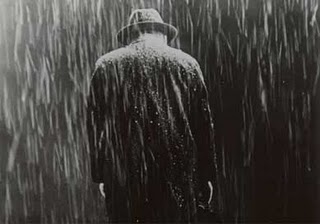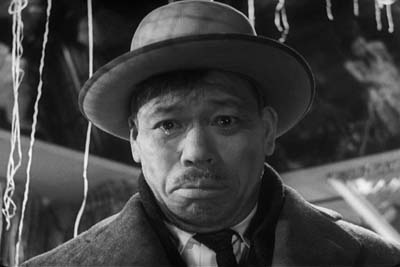
In Ikiru, Watanabe is a man who has worked for the government as a low level bureaucrat for 30 years, and has really done nothing with his life except go to work and come home, sleep, shave, and repeat. Then he finds out that he has stomach cancer, and only has a few months to live. And the movie doesn’t deal with his death so much as it deals with the steps of grief that he goes through in adjusting to his new reality.
 At first, he sits in numb darkness. Then he is haunted by all of the “would have been, should have been, and could have been”. He finds that he has enormous regrets about his life, because for the past 30 years he has lived without living. Then he seeks solace in sake, in late night carousing, the company of women, but none of it sooths his suffering.
At first, he sits in numb darkness. Then he is haunted by all of the “would have been, should have been, and could have been”. He finds that he has enormous regrets about his life, because for the past 30 years he has lived without living. Then he seeks solace in sake, in late night carousing, the company of women, but none of it sooths his suffering.
Finally, he meets a young woman who seems so alive to him in the effervescence of her youth, that he starts spending all of his time with her. And at one of the climactic moments in the movie, he explains to her that he wants to find out what makes her so alive, because he wants to know what it is to live with so much life at least once before he dies. And who wouldn’t? It’s truly touching.
But what is so sad about the movie, the 300 pound gorilla in the middle of the room, is the absence of God—the absence of a God who knows what it means to suffer and is closest to us in our suffering.
Watanabe, being Japanese, is a Shinto/Buddhist, as was the film’s director, and so the movie fails to answer the ultimate question of life, death and its meaning.
 Watanabe ends up finding his answer in pushing a public works project through the bureaucratic system with the last months of his life, to turn a public nuisance into a park for children, which is nice, but as an answer to the question of suffering is thoroughly unconvincing for a believer in Christ, because I know that when I suffer God is there with me.
Watanabe ends up finding his answer in pushing a public works project through the bureaucratic system with the last months of his life, to turn a public nuisance into a park for children, which is nice, but as an answer to the question of suffering is thoroughly unconvincing for a believer in Christ, because I know that when I suffer God is there with me.
This man felt all alone in his suffering to the bitter end, but I know in my suffering that I’m not alone. Tolstoy said, “Where love is, there God is also”. But I would go further and say, “Where suffering is, there God is also, and he’s there out of his love for us.”

COMMENTS
11 responses to “Ikiru ("To Live")”
Leave a Reply














This is the same actor who was the lead in 'The Seven Samurai' I think?!? LOVE these movies…will watch this one now:)
Hey Mark. You're correct. Takashi Shimura (who plays Kanji Watanabe) is the lead samurai in The Seven Samurai. That's another favorite of mine!
Thanks Jeff! It's a brilliant, haunting movie. The opening is inspired:
An x-ray appears on the screen and the narrator says: "This is our protagonist's stomach. You may be able to tell that he is very sick with cancer. But he will have to get a lot sicker before he can get any better."
something like that…
Also, the film diagnoses beaurocracy in a scathingly insightful way that I'm always reminded of whenever I find myself in line at the post office, or on a phone call with customer service.
Brilliant director–I loved 'em all.
Ran is tremendous.
One night at about 2 in the morning I woke up and saw that a black and white movie was playing on the tv I had left on….I began watching it and eventually spent the next 3 hours watching The Seven Samurai….that is the best way to experience a movie I now believe.
I don't think we should forget the line, about a third of the way into "Ikiru", delivered by the Writer, Watanable's guide to the underworld of Tokyo's 'Vanity Fair', to the hostess at the bar:
"Take a good look at him. See? He's god and he's carrying a cross called cancer. Most people die off the minute they learn this. Not him. … From that moment on he ( pronoun italicized in the script) started to live."
'Writer' is capitalized, I notice. Losing life still seems like loss to me…but gain is gaining ground.
John, those were two parts of the movie that I thought were absolutely brilliant. There is so much going on in the movie and I just wanted to highlight one aspect that came to my mind as I watched the movie, but there is definitely so much more that could be mentioned.
For me, I think what made the movie all the more believable were some of the nonverbal aspects of Shimura's portrayal of Watanabe.
For instance, the scene at the hospital, when the man in the waiting room has told him that if you have stomach cancer the doctors won't tell you, but if they tell you you just have a mild ulcer, then it's definitely cancer. Then he walks into the doctor's office for his consult, and as the doctor says, "It's just a mild ulcer" he drops his coat, and in that one action he conveys all the emotion the scene needs.
The other nonverbal that I love is the scene with the writer in the sake bar. The writer sees that Watanabe is doubled over, and asks if his stomach hurts. And Watanabe says, "No" and then simply grabs his chest to indicate that it's his heart that hurts, and the expression on his face in that moment just says everything that needs to be said. (The middle picture in the post is of that very moment from the movie.)
Paul, I was definitely struck by that line from the writer. Thank you for bringing that out. In fact, that line was the genesis for this post. When the writer said that, I started looking for any clue that a savior was coming to the fore, and to the end I kept watching for it (and hoping for it…something, anything) but I never saw any sign of the One who suffered for us and is with us when we suffer.
Well, the only thing I might add, is that Kurosawa directed "Ikiru" immediately after he finished his version of Dostoyevsky' s "The Idiot" (1951), which, along with "Scandal" (1950), was suffused with explicit Christian themes and scenes.
I don't think we could say that Kurosawa was a Christian, as he himself never said he was. (He refused throughout his life to say what his religious views were, if any.) But he was strongly attracted to portraits of death's being the entryway to new life.
Watanable's regeneration, which the long scene of the wake makes poignantly clear posthumously, is certainly anchored in his becoming conscious to the loss of all things because of his diagnosis.
And the Writer's line about cancer being the hero's cross is pointed.
Incidentally, when Lloyd Fonvielle and I saw this movie for the first time in 1966, it was in a seminar at Georgetown University wherein the instructor underlined its implicit (tho' not explicit) Christian dynamic.
Can the Christian view of death in life and resultant life from death be implicit? I think this is a theme of importance for Mockingbird. For me, implicit Christianity, if I could call it that, is part of the bridge that is necessary if we are to reach the world. I wouldn't want to come on too strong about it, as some get uncomfortable when our claims are not asserted with proper nouns. But I would go with "Ikiru"'s standing up as one quite compelling portrait of how justification by faith functions in real life.
Paul, I think that you have hit on an important issue in terms of "proper nouns." It is certainly true that the ideas of death in life and life in death are universal, and that the truth of these ideas, expressed in various art forms even by non-Christians, can be a powerful testimony to a Christian witness that is rooted in gut level reality rather than the repetition of abstact theological claims. So these true ideas can be a bridge to Christian faith. But this does not change the fact that the Christian faith is based on the death and claimed resurrection of a proper noun, not on the assertion of abstract ideas, true though they may be.
This movie had the existential overtones.Heidegger argues,when you come face to face with death,you strongly experience the mood of anxiety.anxiety and death together have a powerful effect on you:they individuate you.in the face of death ,your routines seem artificial.2-people strive hard to avoid death:in akiru ,watanabe suffers partly because he finds it almost impossible to actually find people who will honestly acknowledge his situation.3-death forces you to give your life individual meaning.